Comment on Jean Twenge's Post "The Mental Health Crisis Has Hit Millennials"
Character limits...
Originally this should have been a response to pj’s comment, who commented on
’s article, but Substack responses have a character limit. So I’ll post my comment here. We all get headings now and link previews. Great!A. Introduction
That was a very insightful comment by pj.
I'd like to add some sources where Dr. Twenge and others could get more information about what might be going on.
This post is divided into four sections: Critical Social Justice activism, narcissism, cults, and humor.
Dr. Twenge asked:
But why would a focus on social justice lead to more depression? Wouldn’t coming together with like-minded people for a cause lead to less depression? Those are questions I can’t answer.
B. Critical Social Justice activism
I don't know whether Dr. Twenge didn't want to prime her audience too much or whether she hasn't noticed that there are now two very different approaches to fighting for social justice: Critical Social Justice activism and liberal social justice activism (liberal as in liberalism, not as in being on the left).
The “Critical” approach is the one that is commonly referred to as "wokeness" or "wokeism". The term used in the academy is "Critical Social Justice". The adjectives "Critical" and "liberal" are often left out and then the two opposing concepts blur into one, which is why the radical "Critical" activists can hoodwink people into getting along with their radical demands. The term "Social Justice" isn't the only one that the radical activists use to hoodwink people. Their worldview uses different definitions of common terms like racism, diversity, inclusion, violence, and others. Equity and equality really are not the same things.
Helen Pluckrose has written an article about how to differentiate between Critical Social Justice and liberal social justice that also cites key literature: What do we mean by Critical Social Justice?
But I would also recommend reading her book "Cynical Theories", where she explains all of this in much more detail. A word about here co-author James Lindsay: He got weird and radicalized after the publication of the book on 5/5/2020, probably by spending too much time on Twitter and getting his brain hacked. Keep that in mind when reading articles or books by him that were published later.
And as a quasi recommendation: Jonathan Haidt and Helen Pluckrose are on quite friendly terms. They've talked publicly about "Cynical Theories" and Haidt thought it was essential reading to understand what is going on with social media, society, and mental health, together with "The Coddling of the American Mind".
Helen Pluckrose also recommends this book: "The Rise of Victimhood Culture: Microaggressions, Safe Spaces, and the New Culture Wars".
There is another great post about Critical Social Justice vs liberal social justice in tabular form here: Social Justice: Liberal or Critical?
There is a substack about explaining the tactics the Critical Social Justice activists use to advance their radical worldview, which I would also highly recommend: Keep your Wokal_distance.
This is of course less about mental health and loneliness but understanding how this worldview spreads so effectively using language, social games and other means.
C. Narcissism
I. Victimhood in Critical Social Justice activism
Here is a tweet by Tristan Harris where he connects "mass narcissism" to "teen depression":
Source: https://twitter.com/tristanharris/status/1203027251698245633
Usually people think that this has to do with beautification filters and looks. But what if this plays out differently in Critical Social Justice spaces?
I haven't been able to look into this topic more closely, so I'll give a short summary and leave the rest to the reader.
Sam Vaknin is an expert on narcissism who talks about the psychology of victimhood movements in this interview (Substack’s YouTube preview can’t jump to the timestamp in the link, so here is the direct link to go there manually): Interview.
He does cite some studies and researchers that might be interesting but I haven't tried to look them up.
He talks about people who use victimhood as an identity. Their victimhood is their identity. Their victimhood endows their life with meaning, makes sense of the world, so it's an organizing principle. These people seek to be victims even in situations where they would have not been victimized otherwise. When they are not victimized, they push other people to victimize them. This is called 'projective identification'.
There is a new psychological construct, called Tendency for Interpersonal Victimhood (TIV). This is what I found about it on the internet: "Based on clinical observations and research, the researchers found that the tendency for interpersonal victimhood consists of four main dimensions: (a) constantly seeking recognition for one’s victimhood, (b) moral elitism, (c) lack of empathy for the pain and suffering of others, and (d) frequently ruminating about past victimization." (source)
Sam Vaknin says that these narcissistic people are in the empaths movement.
These people are actually very narcissistic, very grandiose, extremely aggressive, lacking in empathy of any kind, and yet they claim that they have been victimized all their lives because they are superempathic and they are sensitive. And they are proud of their victimhood. They compete with each other: 'My abuser was much worse than your abuser.' 'No, my abuse was unprecendented, I understand that you were abused, I'm sorry for you, but my abuse was much...' It's identity politics.
YouTube link with timestamp: Interview.
So this might not be about looks but about being the better victim. And in the context of Critical Social Justice activism it is of course about who is the most oppressed, which is a concept called “competitive victimhood”. The connected concept from Critical Social Justice Theory is "intersectionality". Intersecting identity categories lead to an oppression pattern that is more and more unique until everybody is their own single oppression group (but not an individual, see Cynical Theories, pp. 127-128). They probably don't find a lot of community when they interact with other people who have the same worldview and do the same kind of activism, as has already been shown by pj. A lot of people might just be using each other for their own narcissistic purposes. While the beginnings of the worldview they have adopted (intersectionality is from the early 1990s) predates our current iteration of social media, worldview and technology now make a perfect match. This shows how current social media makes existing bad ideas or problems much worse.
What's not really obvious to me is whether it's the narcissists who feel lonely and depressed or the remaining non-narcissists, because the narcissists have such a negative impact on the activist groups. Or maybe picking up the worldview is already sufficient for loneliness and depression and the narcissists just add to the misery.
II. Narcissists hijack victimhood movements
Sam Vaknin:
A separate set of studies in Canada and elsewhere has shown that very fast, very soon, within usually two to three years maximum, victimhood movements, such as Me Too, Black Lives Matter, and so on, get hijacked by narcissists and psychopaths. So the infiltration of narcissists and psychopaths is universal in all these victimhood movements and they become the public face of the movement. Victimhood movements are one of the most threatening and pernicious developments. There is a sociologist by the name of Campbell and he said that we have transitioned from the age of dignity to the age of victimhood. It's very dangerous because if you are a perennial victim, if this is your identity, if you are determined by your victimhood, you would tend to develop attendant behaviors. For example, you would tend to feel entitled to special treatment and if you don't get this special treatment you will become aggressive. [...] What I'm trying to say is that the potential for aggression and even violence in victimhood movements is much larger than in the general population.
This leaves out some information for brevity. You'll find more about this in the interview. Use the YouTube link from I. to watch the whole section.
I haven't looked into this aspect that much other than that it kind of makes sense from observing how people act in these activist groups. The aggressiveness and hypersensitivity probably produce a permanent fear of retaliation and social death (cancel culture) in activist groups. This is probably where the authoritarian and very illiberal atmosphere stems from, which in turn might play a part in loneliness and depression.
I haven't heard much of violence inside of activist groups, though. Only the protests on the street can look pretty violent. But that violence is mostly enacted against property.
It’s probably viral social media cancellation campaigns that are so devastating to people, or just how everybody in these groups fears to be the next target of one of those campaigns.
D. Cults are spread by social media
Again, this section starts with Tristan Harris. He and his colleague Aza Raskin host a podcast called Your Undivided Attention. There is an episode where they interview an expert on cults and cult deprogramming by the name of Steven Hassan.
The podcast episode consists of two parts which can be found here:
In his introduction Tristan Harris explains how cults and social media work together:
In fact there is many of the ways [sic?] social media acts like a cult factory. It identifies these buckets of human behavior that are similar. The people who are clicking on flat earth videos or the people who are clicking on various political tribe videos and then pulling you deeper and deeper and deeper into the rabbit hole.
The connection to Dr. Twenge's questions stems primarily from the isolation of the cult members that cults try to achieve. They try to lure people away from friends and families.
But the worldview that the Critical Social Justice activists have might be even more pernicious because it is incompatible with living in communities per se, since it sows division everywhere. Even in their own circles. They believe oppressive power systems are everywhere (unquestionable certainty), they just need to find them and the method they use is "problematizing". So when they start looking for these oppressive power systems, they start with the result and invent or fantasize about how these power systems have manifested in a certain situation according to their worldview. Therefore some call the Critical Social Justice worldview a "universal solvent".
In the podcast Steven Hassan shows an illustration of the "Influence Continuum".
If you compare the right, cultish side of it to what has been said by pj and me so far, you will recognize parallels.
The illustration is based on Steven Hassan's BITE Model of Authoritarian Control:
This post has so far been very critical of leftist Critical Social Justice activism that might be a real cult or just cultish. But the same thing is happening on the right and in between, as Tristan Harris explains:
So, when we criticize or name any groups here, there's going to be people who are going to be offended, people who are believers of various religions, or say MAGAistan or wokeistan. Everyone believes that they have the way, the one truth and everyone believes that the other side... That we're awake but it's the rest of the world that's not awake. I just saw that at the conservative political action conference CPAC, Ted Cruz was speaking and behind him was a big poster that said 'Awake not woke.' So they're saying that we're the awake ones because ‘woke’ is the the bad thing but then the woke people on the left believe that they're the ones who are actually awake to the actual history and and the roots of oppression that we need to actually correct and fix. And then even The Matrix is used on both sides and the right has kind of currently co-opted the phrase 'redpilling'. In the film The Social Dilemma I said 'How do you wake up from The Matrix when you don't know you're in The Matrix?' If you're pro-vaccine you're in a cult of not questioning whether the vaccine is actually safe but if you're anti-vaccine the people who are pro-vaccine say you're in a cult of questioning the validity of something that's saving lives. So everyone is very certain. And just to ground for listeners the stakes of this conversation is why it's so important. If we don't have ways of waking up from the certainty, one of the basic tools that you need is just recognizing 'How would I know if I was wrong?' If I can't even send my mind there that's probably proof that I'm I'm captured by something.
What would be interesting to know is how those cults differ in regard to Dr. Twenge's questions. Is QAnon making people more or less lonely and depressed than Critical Social Justice activism?
There is another interesting aspect when you compare two journalists/creators: Megan Phelps-Roper and Travis D. Brown.
Megan Phelps-Roper is the host of the podcast "The Witch Trials of J.K. Rowling", which has been recommended by Jonathan Haidt. An introductory article by Phelps-Roper can be found here. It mentions the sweet irony that when Rowling's books first came out, it were radical Christians who burned her books. Now, Critical Social Justice activists are burning her books.
Travis D. Brown is a filmmaker and has created the documentary series "The Woke Reformation" that can be watched on his YouTube channel:
What is connecting those two creators is that they both were brought up in different Christian sects or cults. Brown explains his background here.
Phelps-Roper's background can be found on Wikipedia.
So we now have two people who were raised under conditions that many people now become victims of, thanks to social media. Both have found their own way to tell the world about cults with their creative works.
E. Humor
This section mostly consists of a somewhat ordered list of links to posts by the Instagram user @cursed_cancellations.
The categories in the list are made up of common themes that have been mentioned in pj's and my post so far and serve as further proof that we are not imagining things.
I might be way too much into the works of this Instagram account, so please ignore it if you don't like it. The heresy present in these posts is not just funny, it actually gives me hope (did somebody say Hölderlin?).
If you look at these links, please also read the commentary by @cursed_cancellations as it often adds context to the meme.
And since we are living at those times, there will now be a disclaimer: @cursed_cancellations is a very leftist account, as I will now proof with the account description and the first post. But the Critical Social Justice activists will surely find ways to "problematize" the posts anyway.
Account description:
Somewhat-automated economical Earth communism (with normal characteristics)
Post:
The sheer amount of similar posts might make you feel you depressed, though, which is probably a nice demonstration of how Instagram works.
The categories are not perfect. Enjoy.
I. Social Media
1.
2.
3.
4.
5.
II. COVID + Social Media
III. Loneliness/Friendships
1.
2.
3.
4.
5.
6.
7.
IV. Generational Gap
1.
2.
V. Narcissism
1.
2.
3.
4.
VI. Free Range Kids
1.
2.
VII. Language
1.
2.
3.
VIII. Depression
IX. Cancel Culture
1.
2.
3.
4.
5.
6.
7.
8.
9.
10.
X. Perversion of the terms "justice" and "accountability"
1.
2.
3. (post with 6 images)
4.
5.
6.
7.
8.
XI. Liberal white women were the first
XII. Academia
1.
2.
3.
End
Thanks for reading.
Careb




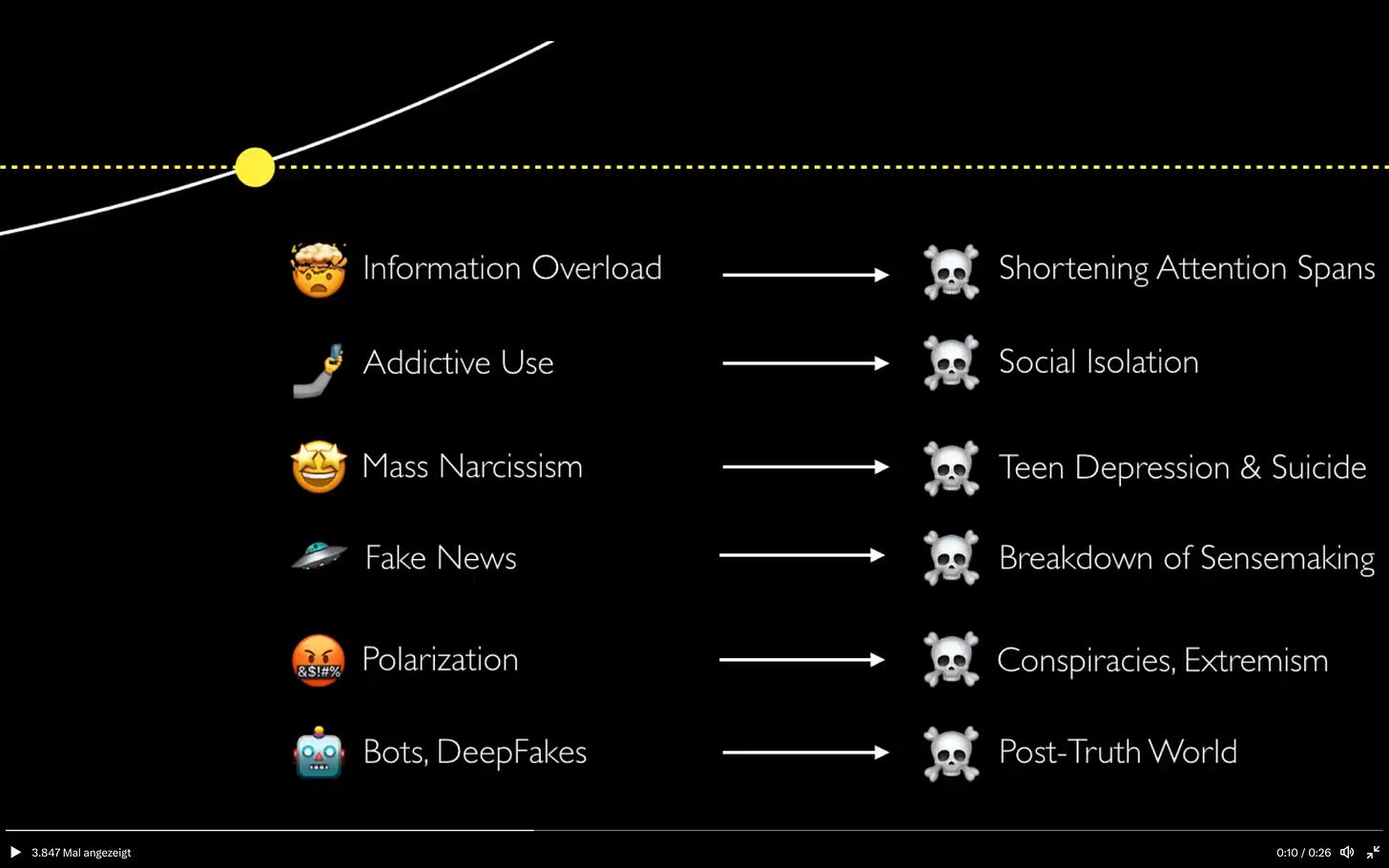
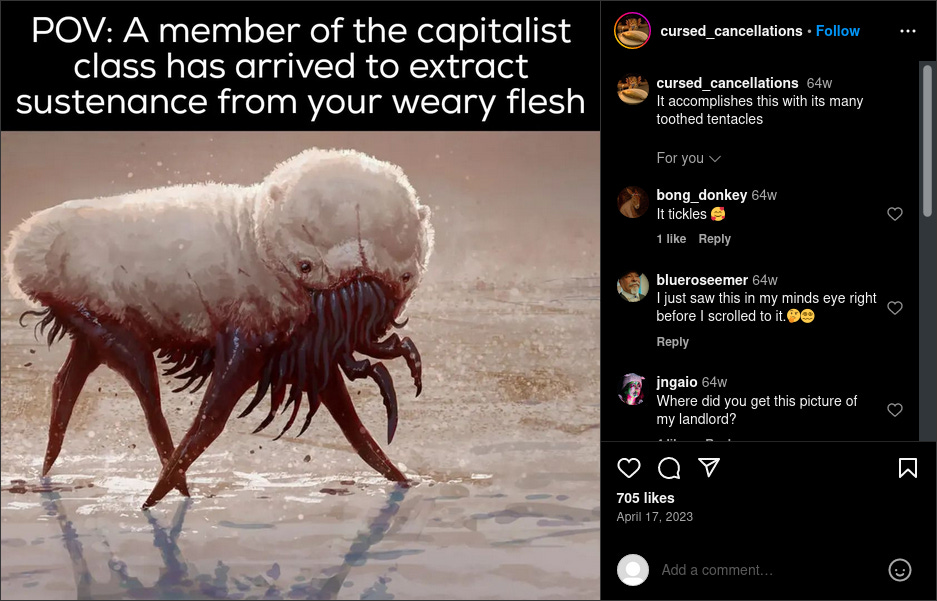



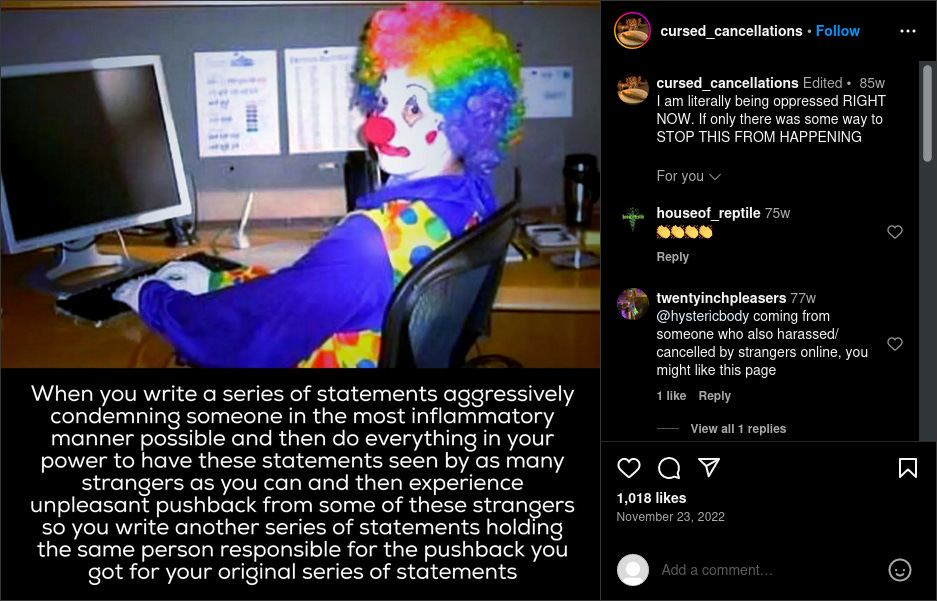




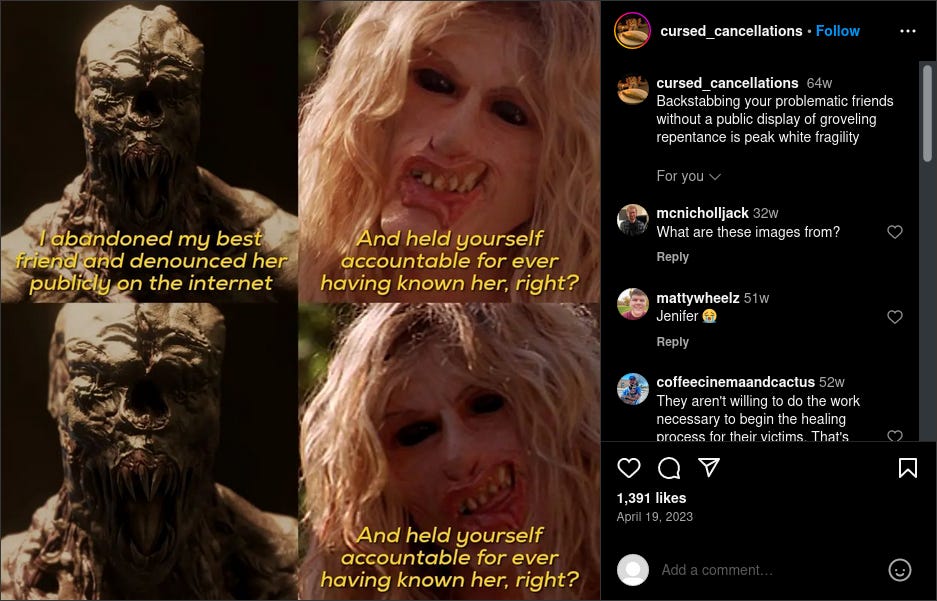

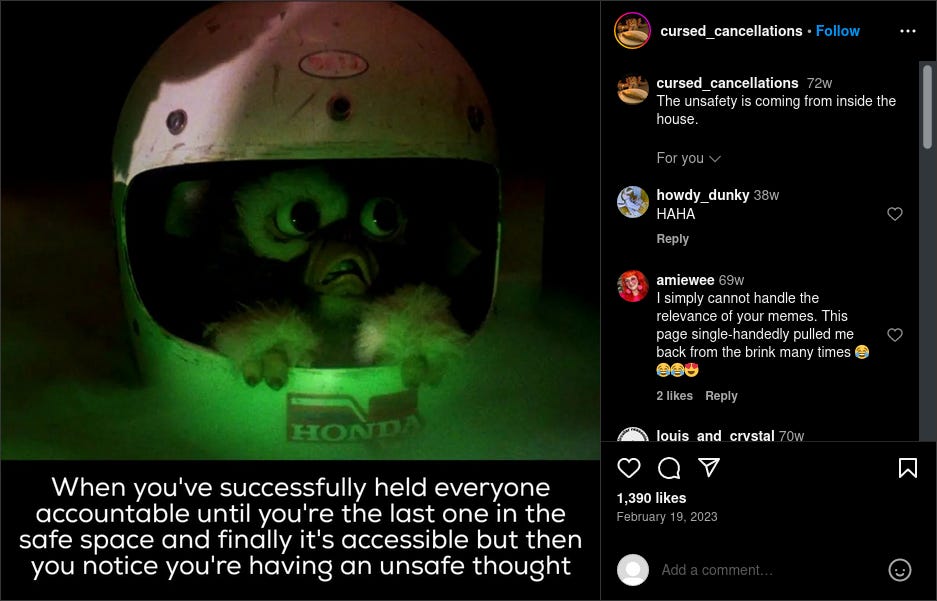




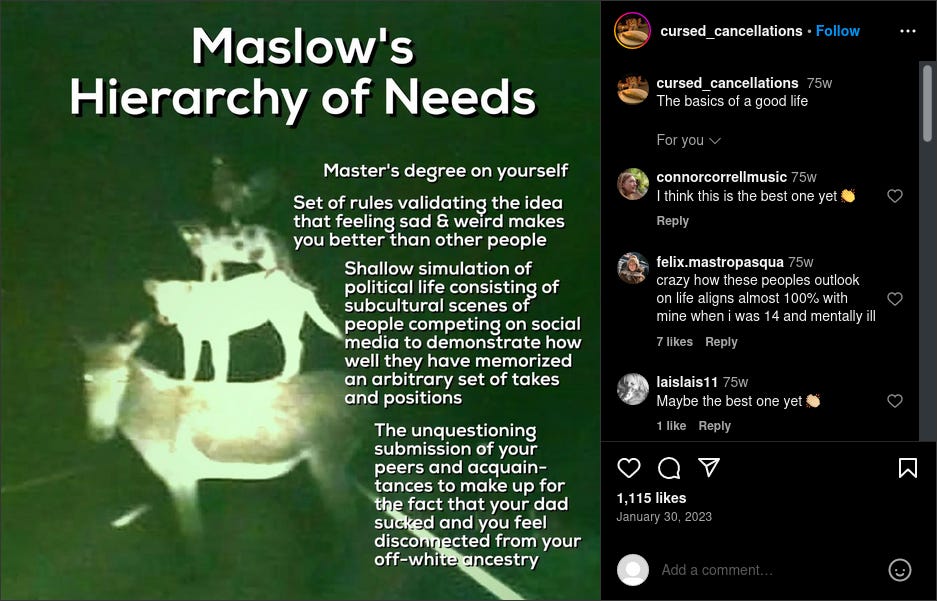

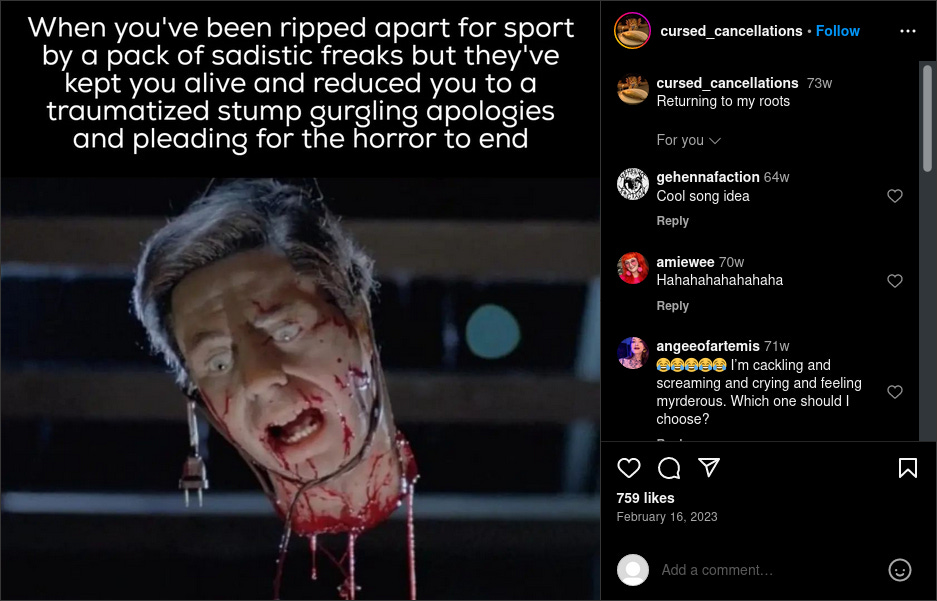
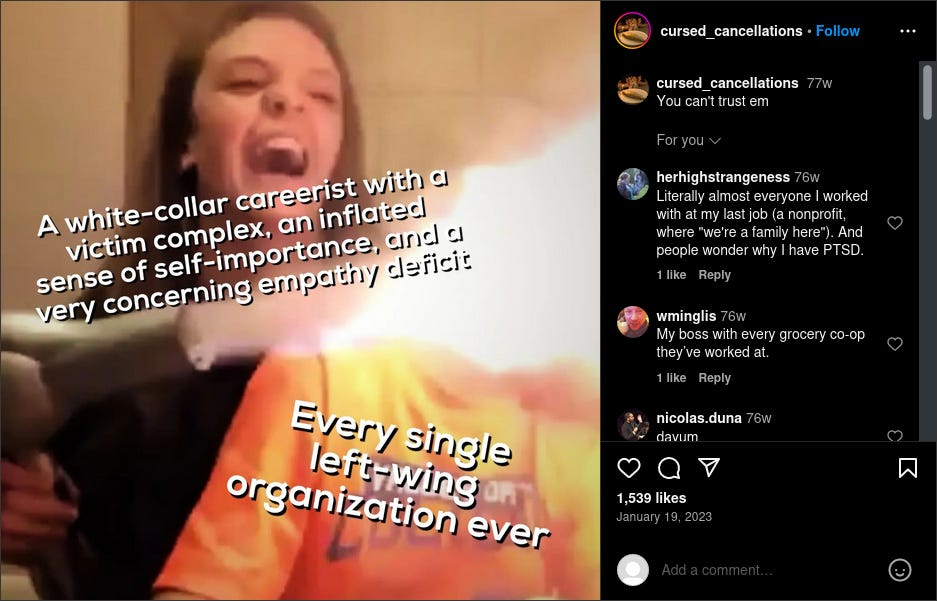

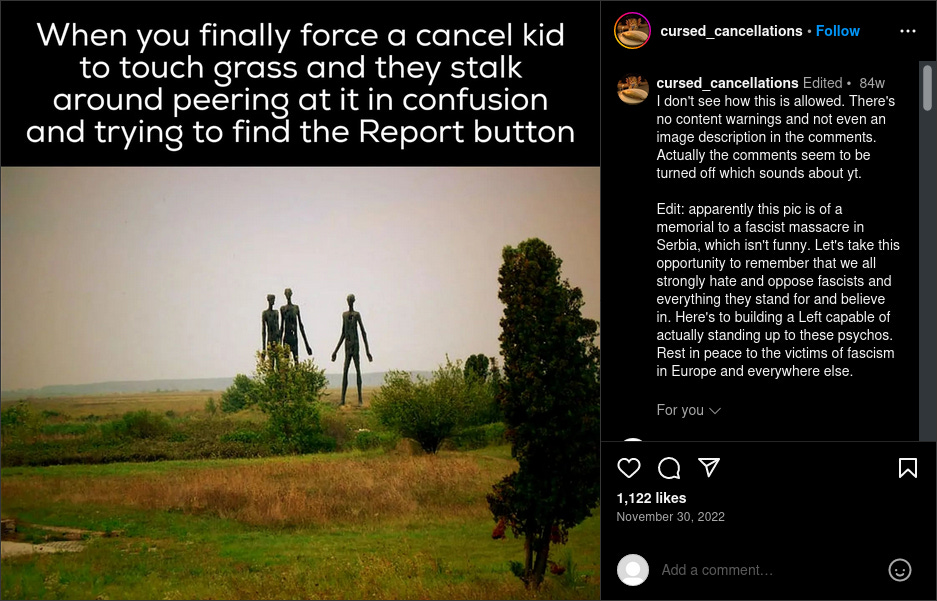
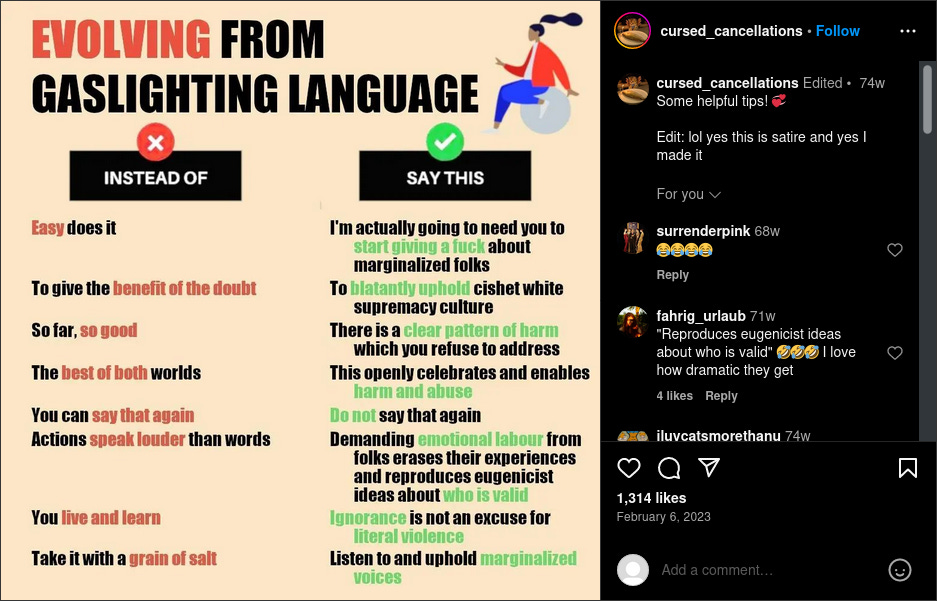
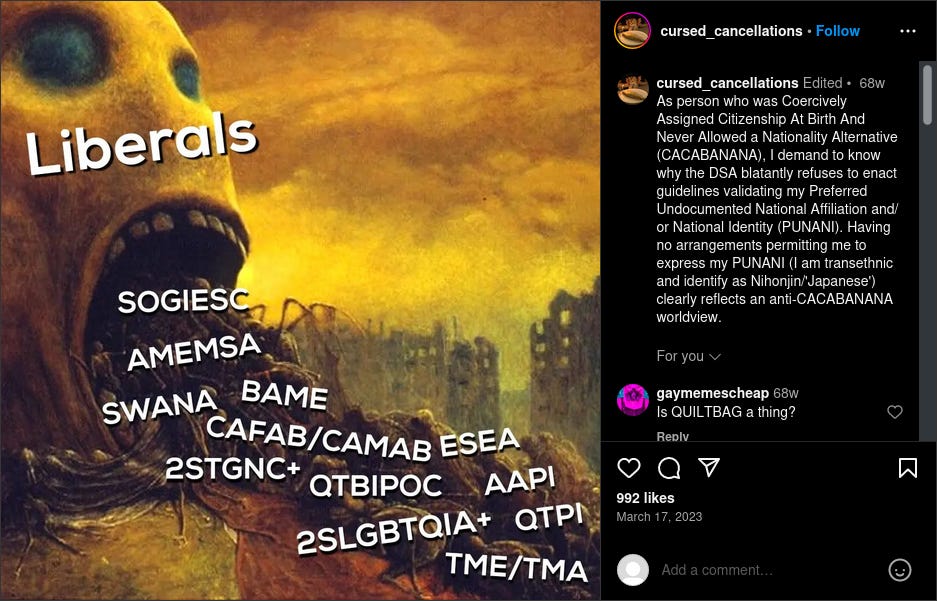

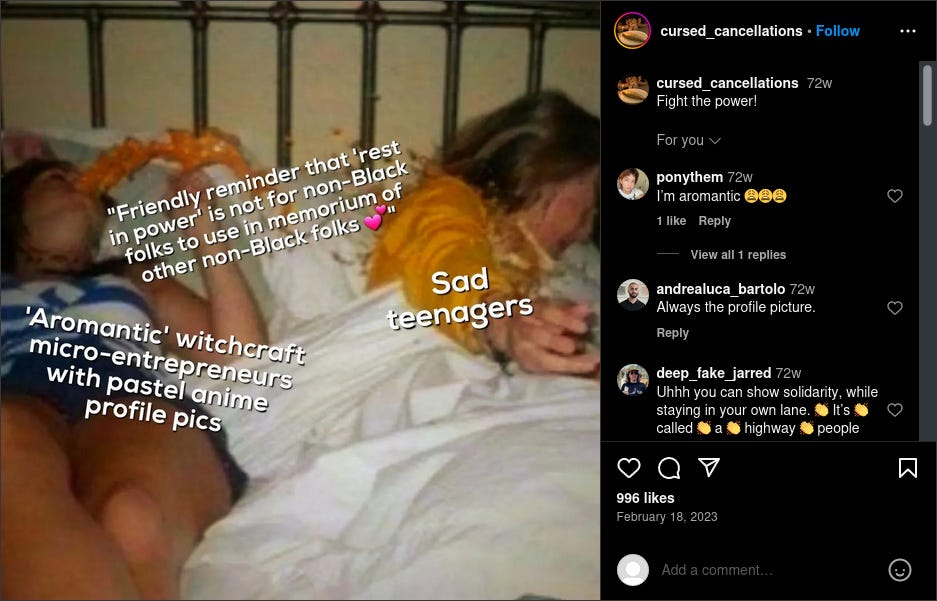
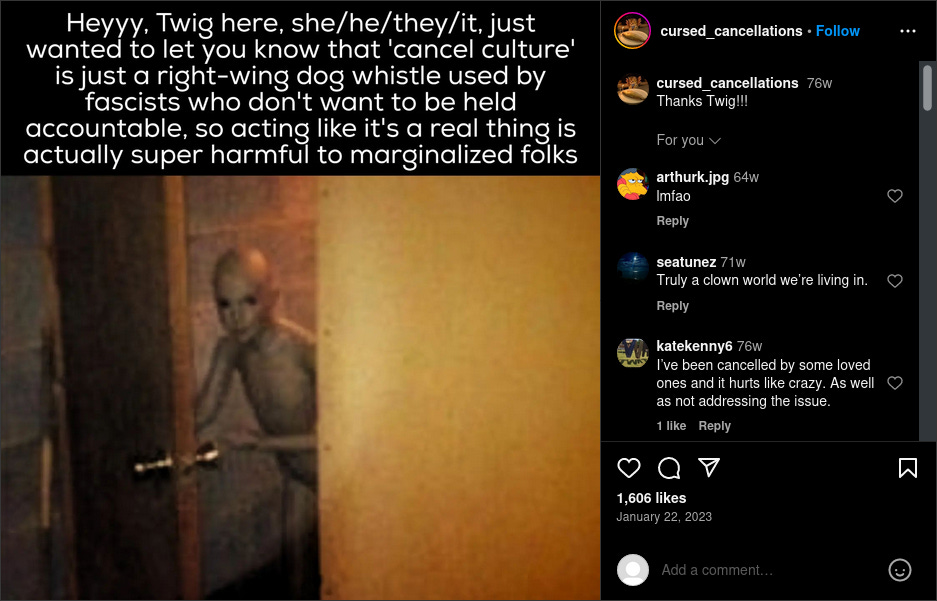



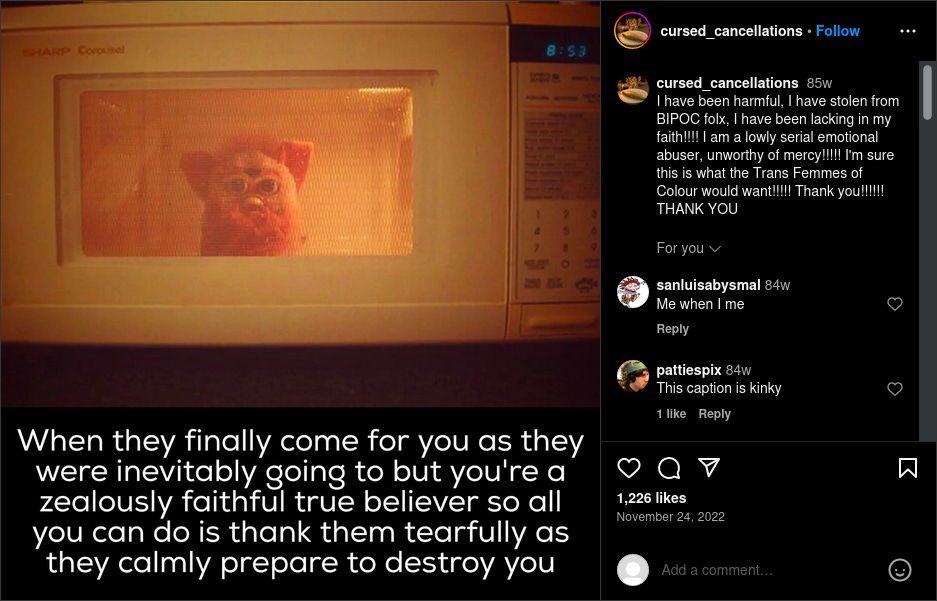
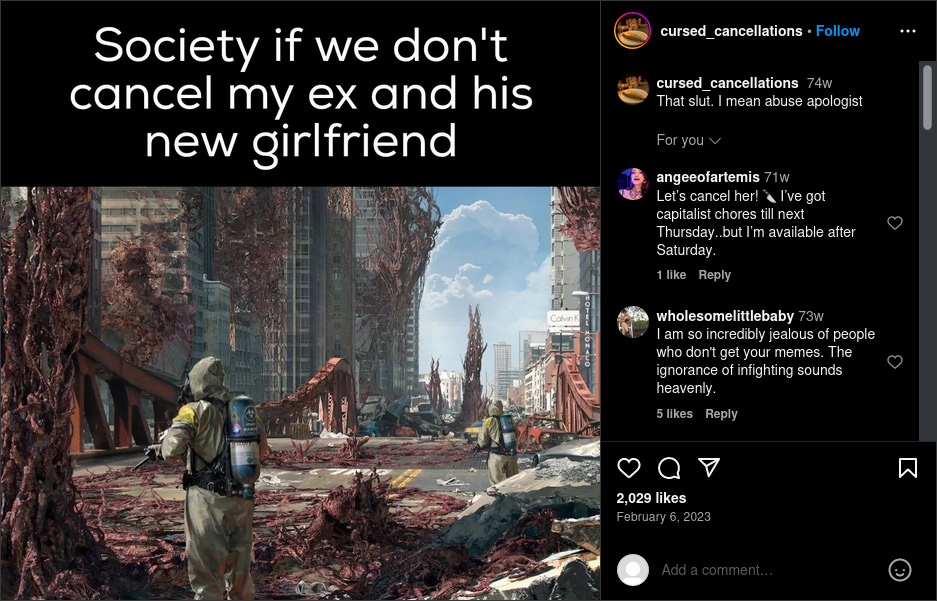

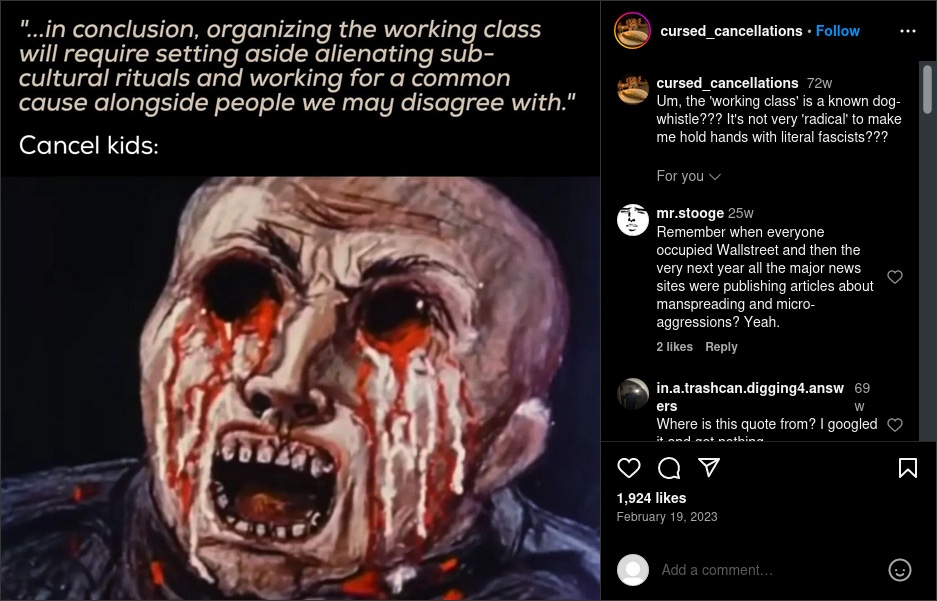




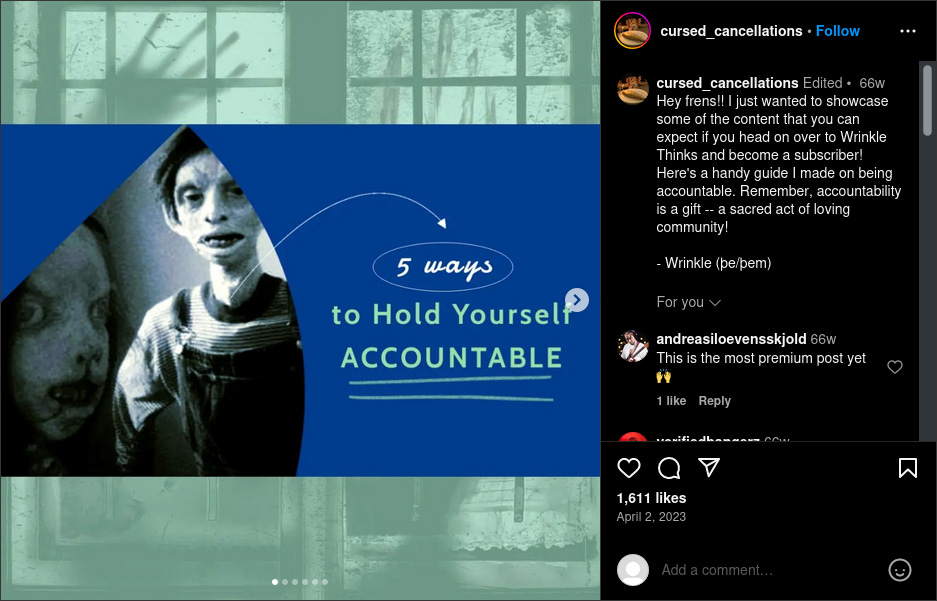


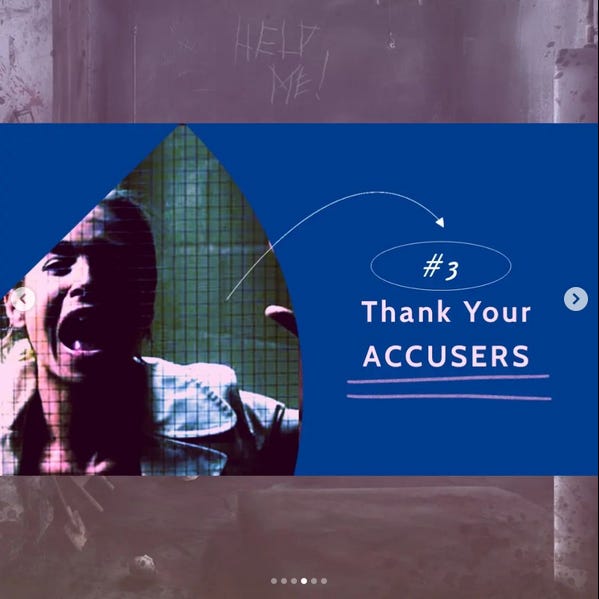
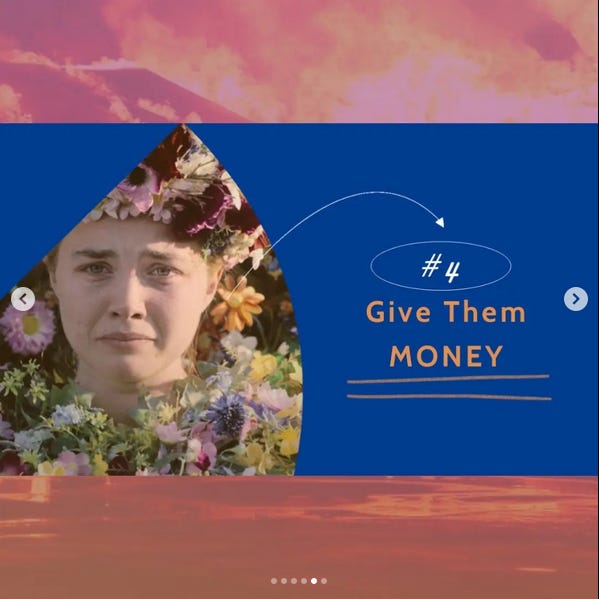

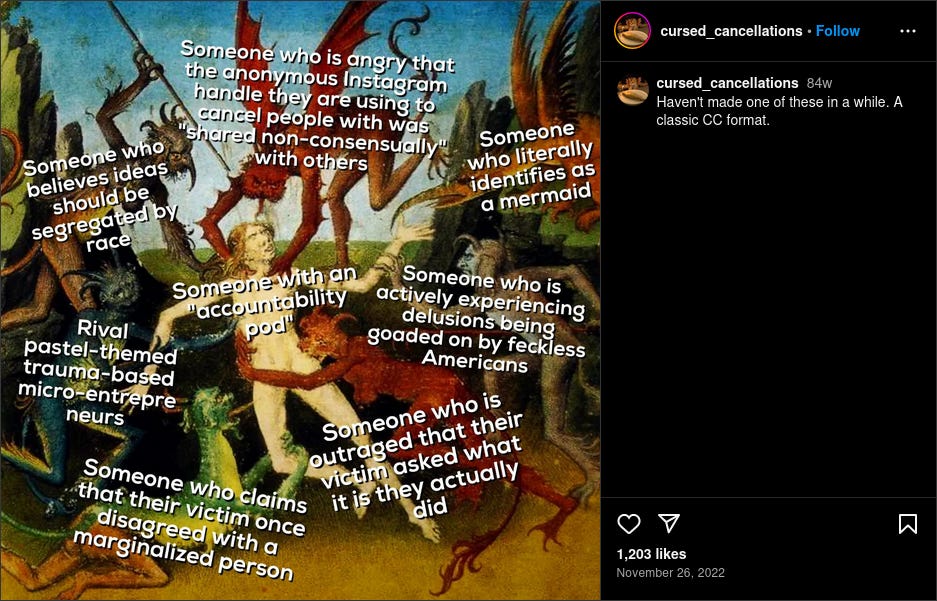







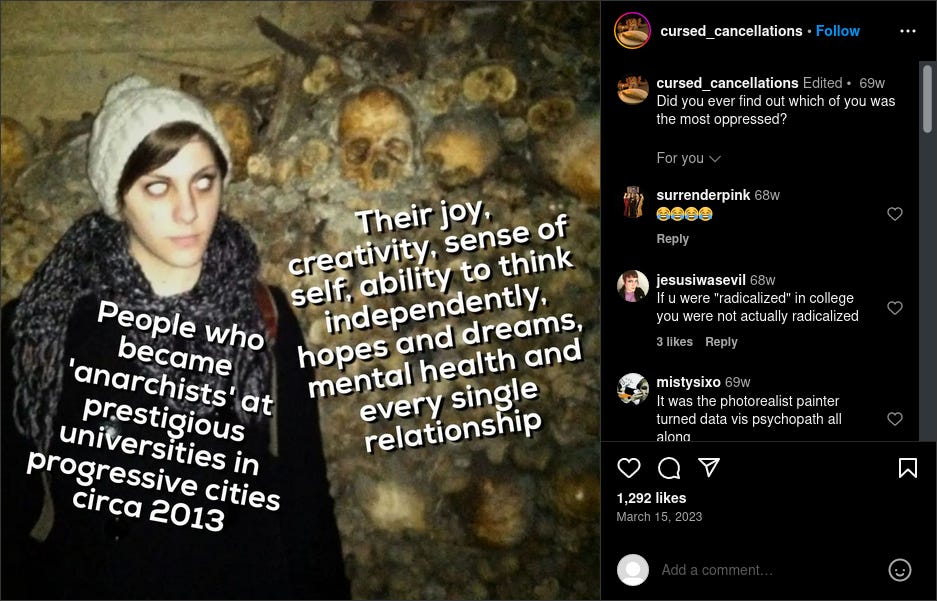
Don't overfocus on social justice communities when the problem is more general than that. PJ's comment, and much of yours, in many places reminded me of another category of online community: incels. Let's list the commonalities: wallowing, corumination, victimhood as identity, competitive victimhood to an extent in the form of a belief that others could not possibly understand our pain and women having their own love life difficulties could not possibly be having our problem and don't belong in our community, an explosion of subidentities, a community that doesn't really function as one and focuses people on themselves, and of course poor mental health. And one could probably find other examples of types of communities with these problems. So I'm doubtful that this is all that specific to social justice ideology. What is it about online communities that makes them frequently gravitate towards this and what's could fix this?